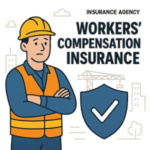
Security Guard Workers’ Comp for High-Rise Buildings: Unique Challenges
September 6, 2025
Digital Policy Delivery: Modernizing Workers’ Comp for Home Health Agencies
September 6, 2025In the state of Georgia, high-risk security operations present unique challenges not only in terms of safety and operational efficiency but also when it comes to securing workers’ compensation benefits. Given the inherent dangers associated with security roles-ranging from physical confrontations to hazardous environments-employees and employers alike must navigate a complex regulatory landscape to ensure proper coverage and claim approval. This article delves into the critical considerations and strategic approaches necessary for successfully obtaining workers’ compensation benefits in Georgia’s high-risk security sector, providing industry professionals with actionable insights to safeguard their workforce and maintain compliance.
Table of Contents
- High-Risk Occupational Categories and Their Impact on Workers’ Compensation Claims
- Navigating Georgia’s Legal Framework for High-Risk security positions
- Best Practices for Documenting Injuries in High-Risk Security Roles
- Strategies for Maximizing Approval Rates in Workers’ Compensation Applications
- Q&A
- Closing Remarks
High-Risk Occupational Categories and Their Impact on Workers’ Compensation claims
Security personnel operating in Georgia face unique challenges that place them at a heightened risk of workplace injuries. Roles such as armed guards,crowd control agents,and private investigators frequently enough involve exposure to violent encounters,hazardous environments,and long,irregular hours that contribute to physical and mental strain. These conditions frequently lead to workers’ compensation claims that are complex,requiring precise documentation and expert understanding of occupational risks. Employers and employees alike must recognize the intrinsic dangers associated with these jobs to better navigate the claims process and improve safety measures.
Understanding the prevalence of specific injury types in these high-risk categories is essential for tailoring effective workers’ compensation strategies. The table below outlines common injury incidents and their impact on claims among security professionals in Georgia:
| Injury Type | Frequency | Average Claim Cost | Common Cause |
|---|---|---|---|
| Assault-related Trauma | High | $15,000 | Physical attacks during duty |
| Slip and Fall Injuries | Moderate | $8,500 | Unsafe environments,poor lighting |
| Repetitive Strain | Moderate | $5,500 | Extended surveillance,equipment handling |
| Stress-related Disorders | Increasing | $12,000 | High-pressure incidents,long shifts |
- Early reporting of injuries helps secure timely compensation and reduces claim disputes.
- Thorough safety training is vital to lowering the risk of injury and reducing claim frequency.
- Detailed medical documentation supports the legitimacy and success of claims.
Navigating Georgia’s Legal Framework for High-Risk Security Positions
Operating within Georgia’s stringent legal environment demands a thorough understanding of state-specific workers’ compensation laws, especially for individuals engaged in high-risk security roles. These positions, often involving physical confrontation or hazardous environments, require meticulous documentation and compliance with statutory safety standards to ensure successful claims processing. Employers must maintain detailed incident reports and promptly report injuries to avoid delays or denials. Simultaneously occurring, employees should be aware of their rights, including eligibility periods, medical benefits, and appeal procedures available under georgia’s workers’ compensation framework.
Key Compliance Factors for High-Risk Security Personnel:
- Timely incident notification to employer and insurance carrier
- Adherence to prescribed medical treatment and rehabilitation plans
- Accurate job descriptions aligning with actual job hazards
- Understanding of exclusion clauses and exceptions within the policy
- Consistent interaction with legal and medical professionals
| Aspect | Requirement | Benefit |
|---|---|---|
| Accident Reporting | Within 30 days of injury | preserves claim validity |
| Medical Examination | Approved specialist evaluations | Ensures accurate injury assessment |
| Return-to-Work Plan | Customized to injury severity | Facilitates quicker rehabilitation |
Best Practices for Documenting Injuries in High-Risk Security Roles
Accurately recording every detail of an injury is paramount when working in security roles with heightened risk. Begin by capturing the exact time, date, and location of the incident, accompanied by a clear description of how the injury occurred. Include statements from witnesses and photographic evidence if possible, as they lend strong support during claims review. Ensure all medical evaluations are documented and promptly submitted to maintain a verified chain of records that can withstand scrutiny.
Adherence to consistency is crucial in injury documentation. Use standardized forms and checklists provided by your employer or workers’ compensation carrier to avoid omissions. Essential elements to note include:
- Type of injury and affected body part(s)
- Initial symptoms and progression
- Treatment administered, including follow-up medical appointments
- Work restrictions or modified duties prescribed
Keeping this data detailed, factual, and organized streamlines the approval process and strengthens your case for rightful compensation.
Strategies for Maximizing approval Rates in Workers’ Compensation Applications
To achieve the highest likelihood of approval in workers’ compensation claims for high-risk security operations, it’s essential to meticulously document every aspect of an incident and worker’s role. Detailing the nature of exposure, protective measures taken, and immediate medical responses will substantially strengthen the claim. additionally, maintaining a comprehensive injury and treatment record, along with timely reporting to both medical professionals and the employer, signals diligence and clarity to claims reviewers.
Employers can also implement strategic steps to optimize claim approval rates by:
- Providing targeted safety training specific to high-risk environments
- Engaging with experienced workers’ comp attorneys to guide the claims process
- Utilizing occupational health specialists to evaluate injuries related to security tasks
- Establishing clear communication channels between workers, management, and insurance carriers
| Approval Factor | Best practice | Impact |
|---|---|---|
| Timely Reporting | Report incidents within 24 hours | Reduces claim scrutiny |
| Medical Documentation | Comprehensive and ongoing records | Validates injury severity |
| Legal Guidance | consult workers’ comp attorney early | Improves claim navigation |
Q&A
Q&A: High-Risk Security operations in Georgia – Winning Your Workers’ Comp Approval
Q1: What defines high-risk security operations in Georgia?
A1: High-risk security operations typically involve security services provided in environments with elevated dangers, such as armed guarding, executive protection, event security at large venues, or working in areas prone to crime or civil unrest.In Georgia, these roles require specialized training and certification to address the inherent risks effectively.
Q2: Why is workers’ compensation approval critical for high-risk security operations?
A2: Workers’ compensation coverage ensures that security personnel injured on the job receive appropriate medical care and wage replacement benefits. Given the inherently hazardous nature of high-risk security roles, securing workers’ comp approval mitigates financial liabilities for employers and upholds legal compliance statewide.Q3: What challenges do security companies face when seeking workers’ compensation coverage in Georgia?
A3: Challenges include demonstrating the legitimacy and necessity of high-risk classifications,managing the fluctuating risk profiles of different security assignments,and meeting Georgia’s regulatory requirements. Additionally, insurers frequently enough scrutinize high-risk operations more closely, leading to higher premiums or coverage denials without proper risk management protocols.
Q4: How can security companies improve their chances of obtaining workers’ comp approval in georgia?
A4: Companies should maintain comprehensive safety programs, provide rigorous employee training, document all risk assessments, and comply with state occupational safety regulations. Working closely with insurance brokers to accurately classify employees and transparently disclose operational risks also facilitates smoother approval processes.
Q5: Are there specific regulatory requirements in Georgia pertaining to workers’ comp for security personnel?
A5: Yes. Georgia mandates that all employers, including security firms, carry workers’ compensation insurance if they have three or more employees. For high-risk operations, it is indeed vital to adhere to additional training certifications and licensing from the Georgia Board of Private Detective and Security Agencies, ensuring compliance that influences workers’ comp eligibility.
Q6: What role does risk management play in managing workers’ comp costs for high-risk security operations?
A6: Effective risk management reduces workplace injuries, thereby controlling workers’ comp claims and associated costs. This includes comprehensive incident reporting, proactive safety measures, ongoing employee education, and post-incident rehabilitation programs.Demonstrating a strong safety culture positively impacts insurance underwriting decisions and premium rates.
Q7: How should a company respond if a workers’ comp claim is disputed or denied in Georgia?
A7: The company should engage legal counsel experienced in georgia workers’ compensation law promptly. Gathering thorough documentation, including injury reports, witness statements, and medical evaluations, is critical. Disputes can be resolved through administrative hearings at the Georgia State Board of Workers’ Compensation or through negotiated settlements.
Q8: Can subcontracted or temporary security personnel be included under workers’ comp insurance?
A8: Generally, subcontractors and temporary workers require separate coverage unless specifically included under the company’s policy. Security companies should clarify coverage parameters within contracts and ensure all personnel performing high-risk duties have appropriate workers’ comp protection to avoid liability gaps.
Q9: What best practices can security firms adopt to maintain compliance and safeguard their workforce?
A9: Best practices include conducting regular compliance audits, investing in industry-specific training programs, maintaining open communication channels for reporting hazards, and using technology-for example, incident management software-to track safety performance and claims trends effectively.Q10: Where can Georgia security companies seek assistance for navigating workers’ comp approvals?
A10: Firms can consult with specialized insurance brokers, legal advisors familiar with Georgia labor laws, and professional associations such as the Georgia Association of Security Companies. Additionally, resources from the Georgia State Board of Workers’ Compensation provide guidance on regulatory requirements and dispute processes.
Closing Remarks
navigating workers’ compensation approvals for high-risk security operations in georgia requires a thorough understanding of both the industry’s unique challenges and the state’s regulatory framework. by proactively implementing rigorous safety protocols, maintaining clear documentation, and partnering with experienced legal and insurance professionals, security firms can significantly enhance their chances of securing rightful compensation for their workforce. Staying informed and prepared not only protects employees but also fortifies the association’s resilience in a demanding operational environment.
“This content was generated with the assistance of artificial intelligence. While we strive for accuracy, AI-generated content may not always reflect the most current information or professional advice. Users are encouraged to independently verify critical information and, where appropriate, consult with qualified professionals, lawyers, state statutes and regulations & NCCI rules & manuals before making decisions based on this content.








